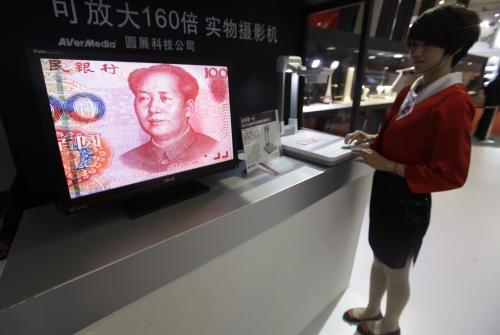 Faced with sluggish economic growth and dwindling exports, China on Wednesday devalued its currency for the second consecutive day, sending fresh shock waves through global markets and fuelling fears of a currency war as jittery Asian neighbours came under pressure to devalue as well.
Faced with sluggish economic growth and dwindling exports, China on Wednesday devalued its currency for the second consecutive day, sending fresh shock waves through global markets and fuelling fears of a currency war as jittery Asian neighbours came under pressure to devalue as well.
The central parity rate of renminbi, or yuan, weakened by 1,008 basis points, or 1.6 per cent, to 6.3306 against the US dollar, narrowing from Tuesday's 2 per cent.
The devaluation on Tuesday by the world's second largest economy, the first since 1994, was effected amid slowing down of the economy which is hovering around seven per cent and falling exports.
The cuts have jolted global share and commodity markets and Asia-Pacific currencies have suffered. Analysts said the move threatens to spark off a currency war as other countries may come under pressure to devalue. Neighbouring Vietnam announced it was widening the band in which its own currency, the dong, is allowed to fluctuate each day from 1 per cent to 2 per cent. This would allow the dong to depreciate faster.
The move sent fresh shock waves through markets round the world but the People's Bank of China (PBOC), the central bank, has sought to calm fears, saying it was not the start of a sustained depreciation.
In a latest statement released on Wednesday, the PBOC said the rate changes are normal, as it shows a more market-based system and the decisive role that the supply-demand relationship plays in determining the exchange rate.
"This may lead to potentially significant fluctuations in the short run but after a short period of adaptation the intra-day exchange rate movements and resulting central parity fluctuations will converge to a reasonably stable zone," the PBOC said.
The International Monetary Fund (IMF) described devaluation of Chinese currency as "a welcome step" that allows market forces to have a greater role in determining the exchange rate.
"Greater exchange rate flexibility is important for China as it strives to give market-forces a decisive role in the economy and is rapidly integrating into global financial markets," an IMF spokesperson was quoted as saying by the state-run Xinhua news agency.
The IMF said it believes China can achieve an effective floating exchange rate system within two or three years. However, the move still surprised the market and prompted the lowest valuation of the yuan since October 2012.
Ma Jun, chief economist at the PBOC's research bureau, attributed the lower rate to a long-standing gap between the central parity rate and the previous day's closing rate on the inter-bank market.
Ma also said the shift is a one-off technical correction and should not be interpreted as an indicator of future depreciation.
A relatively robust economy, current account surplus and the internationalisation of the yuan will help the currency remain stable, the PBOC said. Newly released economic indicators fell short of market expectations, revealing that the Chinese economy still lacks momentum and downward pressure remains.
China's value-added industrial output, which measures the final value of industrial production, expanded 6 per cent year on year in July, down from 6.8 per cent for June, the National Bureau of Statistics (NBS) said on Wednesday.
The decline in output growth ended a steady recovery trend recorded in the second quarter of this year.
NBS statistician Jiang Yuan attributed the drop mainly to flagging external demand, a weak property sector and lowered production of some consumer goods, including automobiles and cigarettes.
Manufacturing output rose 6.6 per cent, mining output added 5.6 per cent, while that of the electricity, heating, gas and water sectors dropped 0.2 per cent, the bureau said.
China's fixed-asset investment, a major driver of growth, also witnessed slightly slower growth, with no sign of improvement for investment in property and infrastructure.
Qu Hongbin, chief China economist at HSBC, said the data fell below general market expectations.
The declining output and investment growth showed the rebound in June was just temporary and pressure for growth was again on the rise, Qu said.
"With gloomy prospects for external demand, China will still need to rely on domestic demand to maintain steady growth, indicating that future monetary and fiscal policies should continue to be relaxed," he said.
Official data showed the Chinese economy hovered around seven per cent growth in H1. Commenting on the sudden yuan devaluation, Tan Yaling, head of the China Forex Investment Research Institute, said it may have something to do with the poor trade data released over the weekend.
"With this move, the central bank intends to prop up the economy as a weakening currency typically helps improve exports," he told the state-run Global Times.
China's exports in July slumped 8.3 per cent from the same period last year to $195.1 billion.
"While some emerging-market economies allowed their currencies to depreciate against the dollar, the yuan was still pegged to the greenback for the purpose of exchange rate stability, which led to relative appreciation against various currencies and put pressure on its exports," Zhou Yu, director of the Research Center of International Finance at the Shanghai Academy of Social Sciences, said.
"The devaluation was necessary to ensure the stability of the currency's real effective rate in the context of the strengthening dollar," he said.
Zhou also said that the central bank has been seeking to widen the range and elasticity of China's exchange rate mechanism and it seems a good time for the PBC to act.
"Since inflation has been relatively low in recent months, a moderate devaluation won't cause much inflationary pressure for now," he explained.
According to Zhu Zhenxin, a research fellow at the Research Institute of Minsheng Securities, China's yuan has been facing great devaluation pressure and the PBC move could mean that the regulator will likely continue its free-market push to allow the currency's exchange to float more freely.
Some economists are linking the central bank's move to China's bid to get the yuan included in the Special Drawing Rights (SDR), international reserve currencies used by the International Monetary Fund (IMF).










